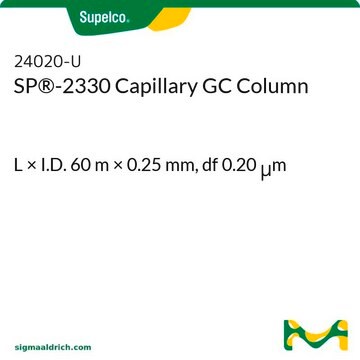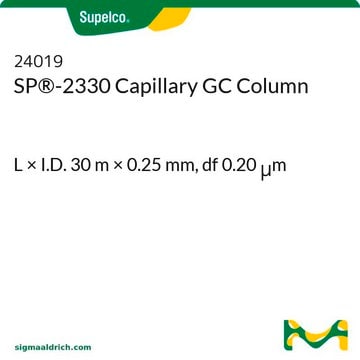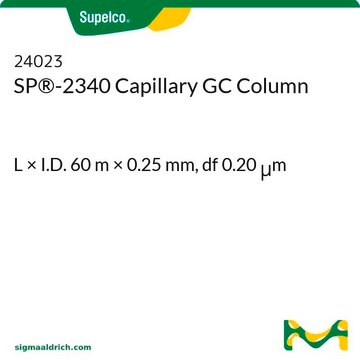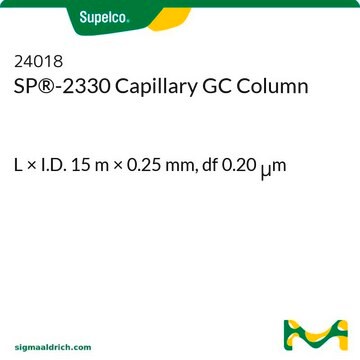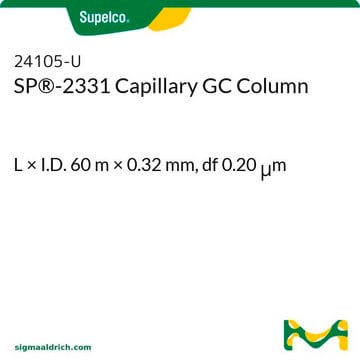24074
SP-2330
L × I.D. 60 m × 0.32 mm, df 0.20 μm
Se connecterpour consulter vos tarifs contractuels et ceux de votre entreprise/organisme
About This Item
Code UNSPSC :
41115710
eCl@ss :
32119290
Produits recommandés
Matériaux
fused silica
Agence
meets requirements for USP G8
Paramètres
≤25-250 °C temperature (isothermal or programmed)
Valeur bêta
400
df
0.20 μm
Technique(s)
gas chromatography (GC): suitable
L × D.I.
60 m × 0.32 mm
Groupe de la matrice active
Non-bonded; poly (80% biscyanopropyl/20% cyanopropylphenyl siloxane) phase
Type de colonne
capillary highly polar
Vous recherchez des produits similaires ? Visite Guide de comparaison des produits
Description générale
Capillary GC column is also known as open tubular column. The carrier gas flows through the central aperture and is unrestricted throughout the length of the column.
Application: Supelco offers the broadest range of biscyanopropyl phases in the industry. This column is a highly specialized column that offers both polar and polarizable features due to the substitution of biscyanopropyl and phenyl groups onto the polymer backbone. It can be used for both high and low temperature separations for analytes such as geometric isomers of fatty acid methyl esters (FAMEs), dioxins, and aromatic compounds.
USP Code: This column meets USP G8 requirements.
Phase:
USP Code: This column meets USP G8 requirements.
Phase:
- Non-bonded
- Poly(80% biscyanopropyl/20% cyanopropylphenyl siloxane)
- Subambient to 250 °C (isothermal or programmed)
Application
Capillary column of SP®-2330 is suitable for being used in gas-liquid chromatograpgy (GLC), used for separation of partially methylated alditol acetates.
Autres remarques
We offer a variety of chromatography accessories including analytical syringes
Informations légales
SP is a registered trademark of Sigma-Aldrich Co. LLC
Faites votre choix parmi les versions les plus récentes :
Déjà en possession de ce produit ?
Retrouvez la documentation relative aux produits que vous avez récemment achetés dans la Bibliothèque de documents.
G Bellomonte et al.
International journal for vitamin and nutrition research. Internationale Zeitschrift fur Vitamin- und Ernahrungsforschung. Journal international de vitaminologie et de nutrition, 61(1), 91-97 (1991-01-01)
The aim of this paper is to develop a gas chromatographic method for the quantitative determination of linoleic acid in adapted, preterm, follow-up and special infant formulas. For sample preparation, lipids were extracted with a Soxhlet extractor after acid hydrolysis
A Spangelo et al.
Journal of dairy science, 69(7), 1787-1792 (1986-07-01)
A quantitative method for determination of free fatty acids in milk is described. Free fatty acids and some glycerides were extracted from milk in acetonitrile in the presence of sulfuric acid and anhydrous sodium sulfate. The filtered extract was evaporated
M Martinez et al.
Journal of neuroscience research, 20(4), 484-490 (1988-08-01)
The total fatty acid composition of the human retina was studied during early normal development and compared to that found in infancy and in adulthood. The retina of an infant undernourished prenatally and of two malnourished postnatally were also studied
M M Pope et al.
Journal of chemical ecology, 8(7), 1043-1055 (1982-07-01)
Sex pheromone gland volatiles from individualHeliothis virescens (F.) females were collected and analyzed on an SP-2330 capillary gas-liquid chromatography column for identification and quantification of the compounds emitted. Only four of the seven compounds previously reported as pheromone components appeared
Analytical methods for structure and biosynthesis. Science and Technology of Fructans.
Suzuki MN and Chatterton J.
Technology & Engineering, 111-112 (1993)
Notre équipe de scientifiques dispose d'une expérience dans tous les secteurs de la recherche, notamment en sciences de la vie, science des matériaux, synthèse chimique, chromatographie, analyse et dans de nombreux autres domaines..
Contacter notre Service technique